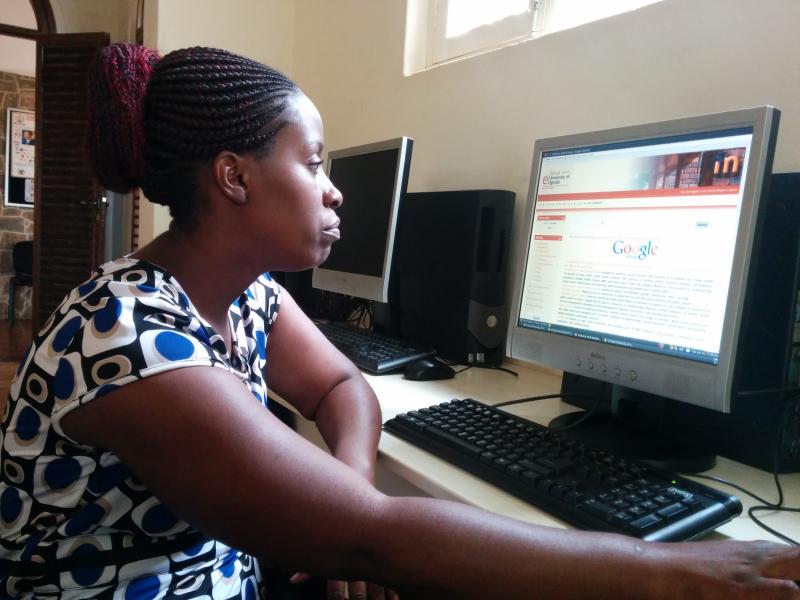One University, fully licensed by the Uganda National Council for Higher Education has introduced a new paradigm to education. One, that brings education to where you are, wherever you live at anytime you want. Virtual University of Uganda is the first online university in the region offering postgraduate online courses in the fields of Public Health, ICT for Development, Executive Business Administration and International Development. Their target as you can tell are professionals with an undergraduate degree who would like to further their careers.
Virtual, but not all too virtually virtual
Even though they are fully online or virtual as they like to refer to themselves offering online learning(e-learning), they have real buildings in the real world. But this isn’t your conventional university on vast acres of land. When I visited the university campus located at Muyenga, Kampala Uganda, the whole university is built on less than an acre of land. That’s on purpose according to Professor Michel Lejeune, the Vice-Chancellor of the university with whom I met. Prof. Lejeune told me they wanted to prove to the world that you don’t need exorbitant resources to run a fully fledged university — at least not when you have the power of technology at your disposal. Running an online university has enabled Prof. Lejeune to run the university on a lean budget. With only about 5 staff members physically present at the brick-and-mortar campus, the university spends only a fraction on administration costs compared to conventional universities. Prof. Lejeune does not just rely on only 5 people, he collaborates with tens of other freelance tutors and lecturers from across the world who offer online education to their widely distributed students from across Africa. About 30-25% of all the students who are currently about 65 are not from Uganda at all. They are from Somalia, Eritrea, Ethiopia, Sudan, Malawi and other countries according to Prof. Lejeune.
Powered by Tech: The classroom anywhere anytime
Having attended a brick-and-mortar university for my undergraduate studies at Makerere University, I could not understand how anyone could attend lectures, accomplish assignments and do exams outside of 4 corners of a classroom. The secret is with all of us — modern technology. The university uses Moodle (acronym for Modular Object-Oriented Dynamic Learning Environment), a popular free software e-learning platform with a user base of 83,008 registered and verified sites, serving 70,696,570 users in 7.5+ million courses with 1.2+ million teachers. The platform is so robust that it offers everything you would ordinarily get from the conventional teaching style, and perhaps even more. The platform features assignment submission, discussion forums, supports file downloads, grading by lecturers, instant messages, an online calendar, online news and announcements (college and course level), online quizzes, wikis for notes and meetings and more. When Lindo Ndagire Victoria , the University Secretary showed me around the system with live students, assignments, I was completely blown away at how simply the system just works. Even more interesting is the university library integrated with Google Scholar which gives students access to millions of academic journals and books from across the world freely to students. The university as you would expect relies on high-speed internet which they lease from Roke Telkom to execute its day to day activities. Among other tools that make it work is TeamSpeak3, a proprietary Voice-Over-Internet Protocol (VoIP) software that allows students and the lecturers to speak on a chat channel with fellow other students, much like a telephone conference call with just a microphone. It’s a low-bandwidth alternative to Skype in simple terms so that students do not incur so much data costs. The University is also taking advantage of Google’s products for Education which according to Prof. Lejeune are free for Africa as long as you can prove you are an educational institution. With the power of the Google Cloud on their side, infrastructure and software is completely sorted. Google for Education offers everything you use from Google Search, Mail, Drive, File Sharing, Search, Scholar etc. This further cuts down on the University’s costs of operation.
Everyone is invited, but with an internet-enabled laptop
But how do you prepare students for this kind of high-tech learning environment? The university is quite clever. One of their pre-requisites of joining is that students should have an internet-enabled laptop and should be fairly proficient with computers. Even though this is the first step in preventing future problems, the university also has a one week orientation programme aimed at familiarizing freshmen with the university system.
Why virtual reality is better than real
So why would this new approach to learning be any better than the good old brick-and-mortar setup? The simple answer is that it facilitates people to continue with their education and at the same time be able to also continue working at their workplace. It is hard to believe that the future of education is happening now. Not in the US or Europe, it is right here in Africa. Virtual University of Uganda is among the pioneers undertaking this new paradigm shift in education. According to Prof Lejeune it will take another 10 years or so before this new way of learning starts trickling down to undergraduate and secondary school studies in Uganda. Image: Virtual University of Uganda campus

